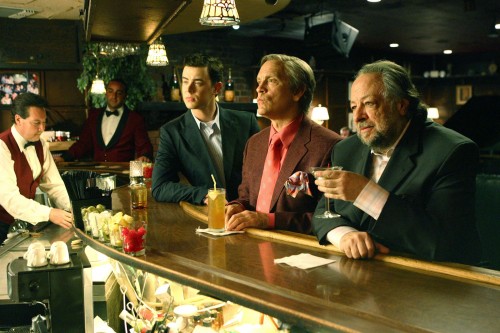The Great Buck Howard
A Lighthearted Malkovich Film?

Starring: John Malkovich, Colin Hanks
By Robert Patrick
The booths, though old and worn, have a makeshift sealant of cigarette smoke and stale cologne, an oily lamination of nights past. And a man walks into the room, his flamboyant suit adorned with pronounced lapels, his hair the color of a bar’s ashtray, and, all the while, his arms energetically drive through the air, almost as if he was directing airplane traffic. The man in question, and also the film’s title character, is The Great Buck Howard, a washed up mentalist – he refuses the moniker of magician. Having had played spots on the Johnny Carson show – over sixty times, he says – Buck behaves as if he is still relevant, chasing a spotlight that has since passed him up.
Troy Gabel (Colin Hanks), a lanky student fresh out of college, is a struggling writer who needs a job. Because Hanks had essentially played this role once before in Orange County, one would assume that it was relatively easy to shoehorn him into this movie. Within only a few moments time, Troy circles a gig posted in an entertainment blurb about being an assistant to a great showman, and heads to his destination.
After meeting with the egocentric Buck, Troy takes the position with the moody entertainer. And though Troy is the purported central character, we realize that, while he is the torchbearer for the narrative, the movie isn’t really about him. Buck Howard, the obvious mantelpiece to the plot, isn’t really the main protagonist, either. The movie, in fact, is about the ubiquitous nature of imagination. And while things that entertained us once may bore us now, the idea of magic, forever romanticized in our memories of childhood, still matters to us somewhere. Because of this, the film’s director, Sean McGinley, makes the right choice in making nostalgia – not a person – the main character in his picture; everyone else is simply a witness.
During Buck’s insufferable tour across the mighty plains of America, Troy, becoming disenchanted with the outspoken mentalist, mews and cringes. But, because of his boyish naiveté, the young assistant continues to put up with Buck’s insatiable attitude, accepting whenever the boisterous entertainer growls, winces, or behaves like a prima donna. The escapades of the odd couple, ranging from ludicrous to the greater pantheons sincerity, are written with a keen sense of adoration for its subject. And even though some of the Malkovich vehicle should have its wheels coming off, it manages to stay upright throughout the duration of the film. Watching Buck Howard claw for a career resurgence is surprisingly endearing, even when some of the pacing gets sloppy – and believe me, in places, some of this movie has the stability of a shifting tectonic plate.
The character of Buck Howard, unyielding and delusional as he is, remains, for the most part, an affectionate and principled man. Much like Rupert Pupkin in Martin Scorsese’s The King of Comedy, another movie dealing with the exploration of celebrity, Buck grapples with the unhealthy idolatry of fame and approval. But unlike Pupkin’s unchained hysteria, Buck never completely saws himself off from reality, giving the film a different narrative on the subject of media and its sometimes dehumanizing effects on people’s psyches.
John Malkovich, playing a part other than a maniacal heavy, utilizes his unique palette of facial tics in a role that he, alone, could only make believable. There are points in this film where bewildered contortions flush across his face, forced grins bend his lips with the resistance of a bow string, and sadness hangs over his eyes with the weight of an anvil. Some of these images, because of their unwavering authenticity, are more memorable than they would otherwise be if done by another actor of a lesser caliber.
The Great Buck Howard, for all of its emotional turns, is also a comedy that gets a few good laughs in. John Malkovich, who in several scenes plunks away on a piano, his fingers crashing down haphazardly, plays “What The World Needs Now Is Love”, and effortlessly attracts smiles for the sheer novelty alone.
But what really resonates, far more than the witticisms and wry gabbing of the cast, are the moments of isolation and connection that the movie so aptly conveys. You can imagine that sometimes drinks, sitting there in bad bar lighting, ice protruding from the alcohol, look like stagnate pond water on lonely nights. The road to show business doesn’t always involve lights and full houses, but instead the churning of worn tires and the creak of an empty diner.
The Great Buck Howard creates, in many ways, the perfect blend of humor and drama to create a fantastic dialogue about dreams and the porous boundaries surrounding them. The only thing I wish, above all else, is that Tom Hanks, who makes an appearance in this film, didn’t play Colin Hanks’s actual father – this, as you can imagine, is distracting. I would’ve approved of anyone else, from Peter Falk to Lauren Bacall, but not Tom Hanks. Nevertheless, the film is a relief to the creative bottleneck in Hollywood. The Great Buck Howard is charming, convivial, and innocuous enough to motivate me to recommend it.
3.5/5
